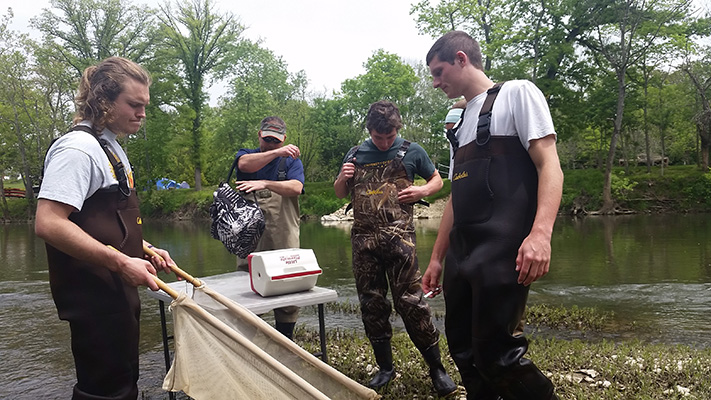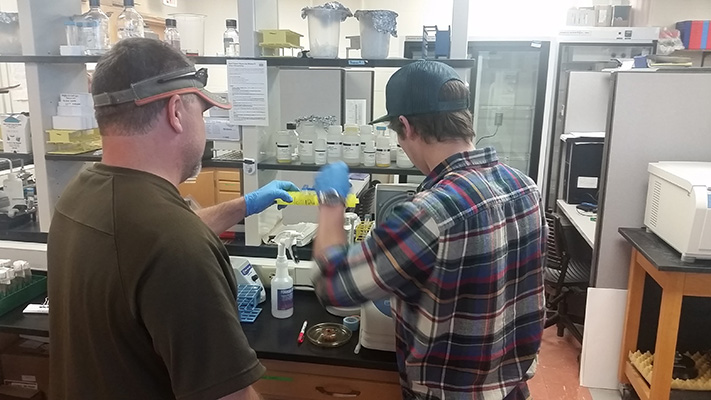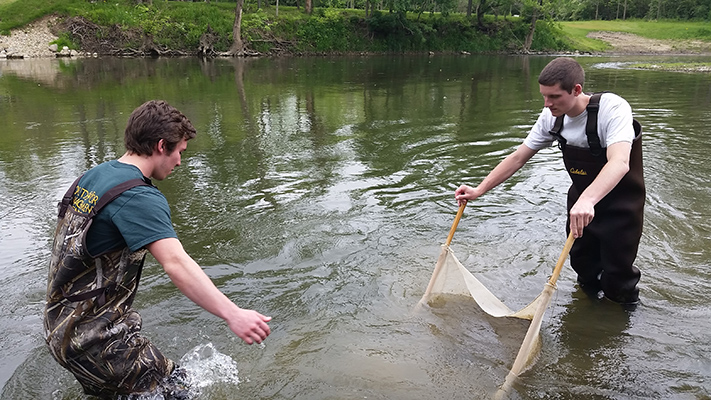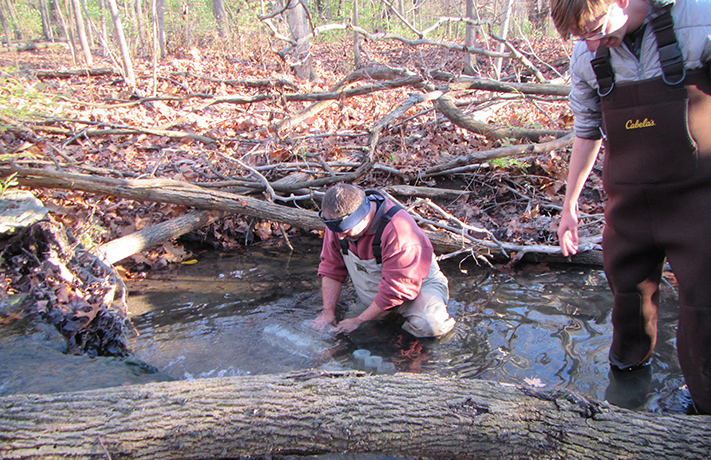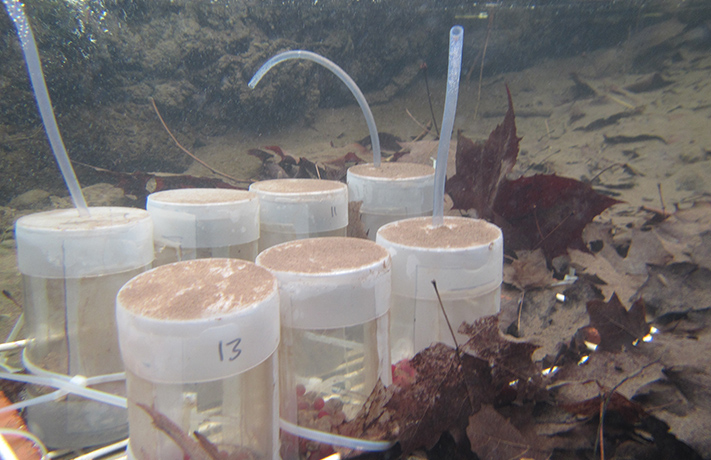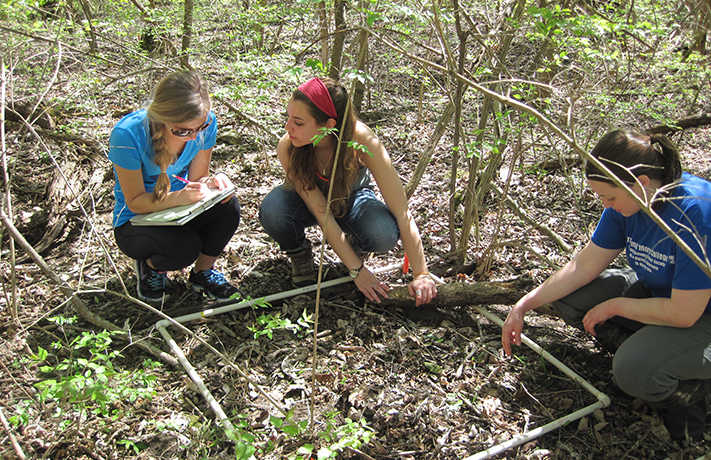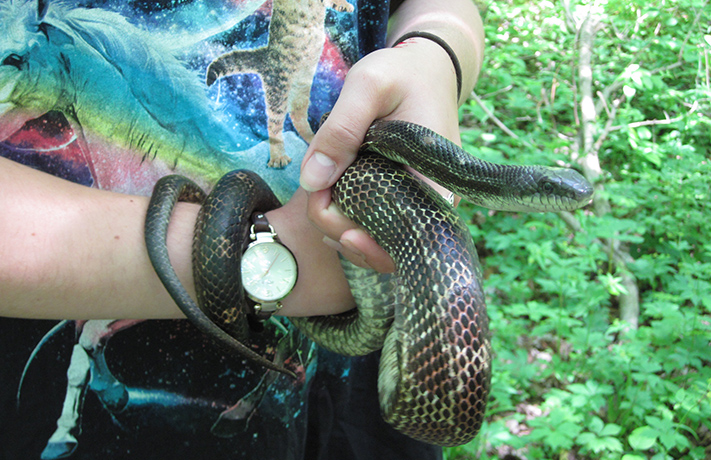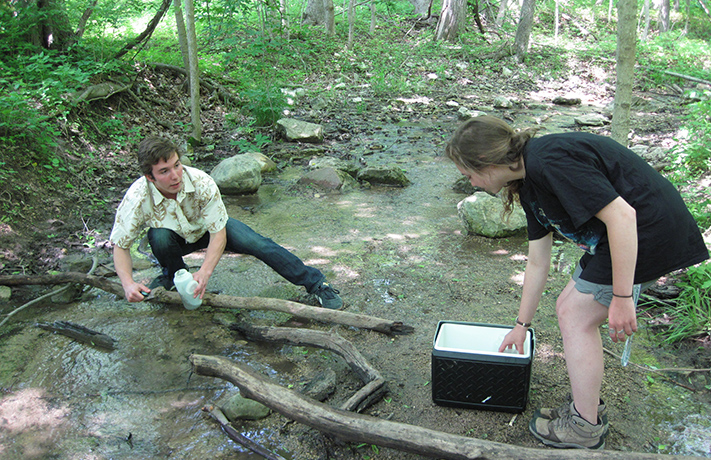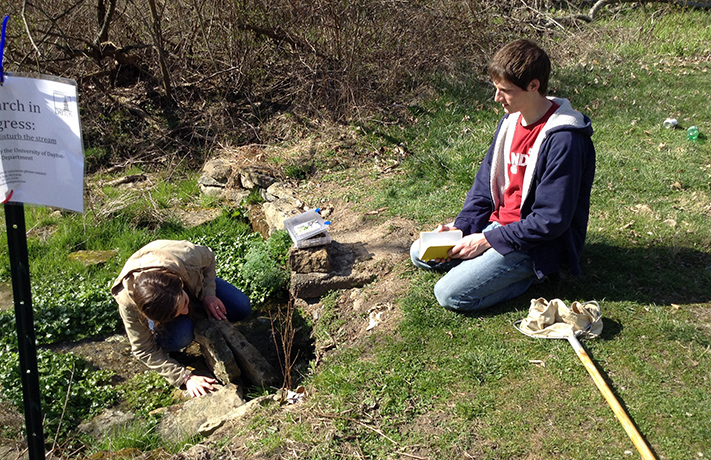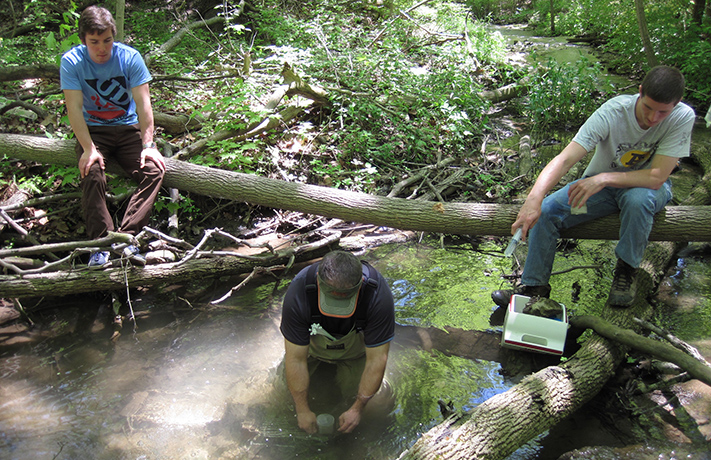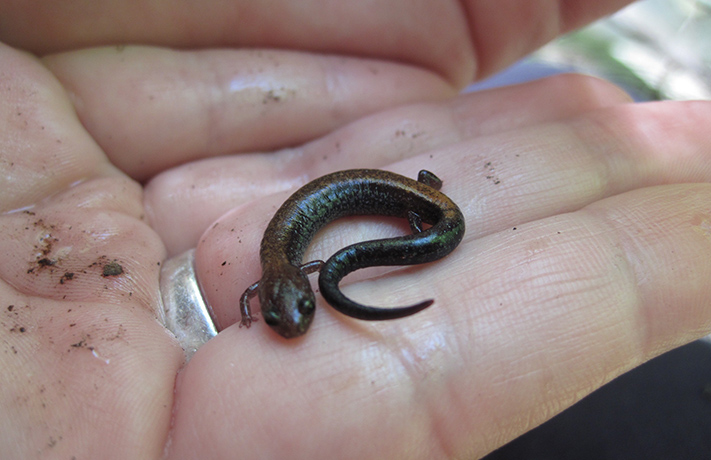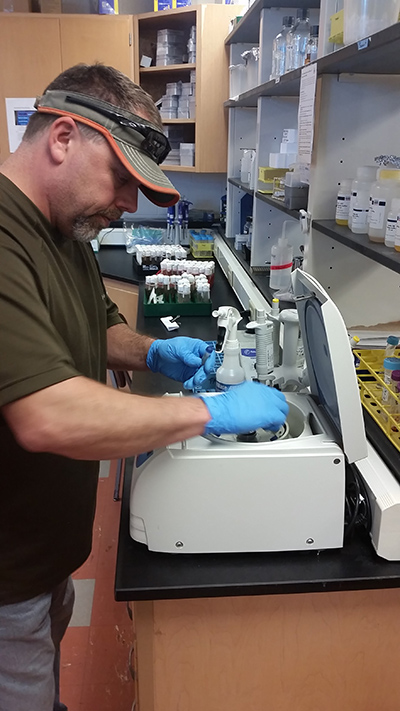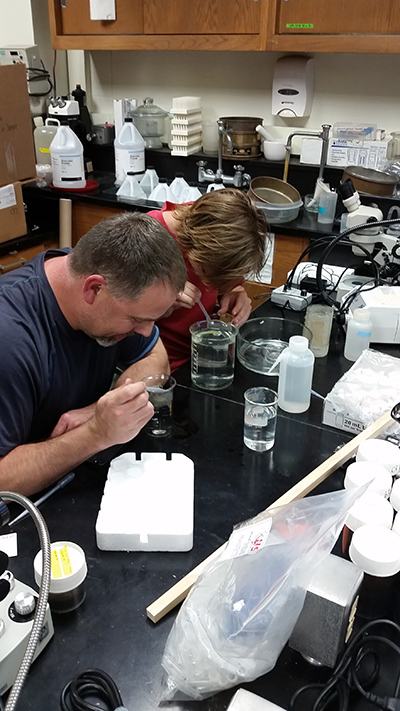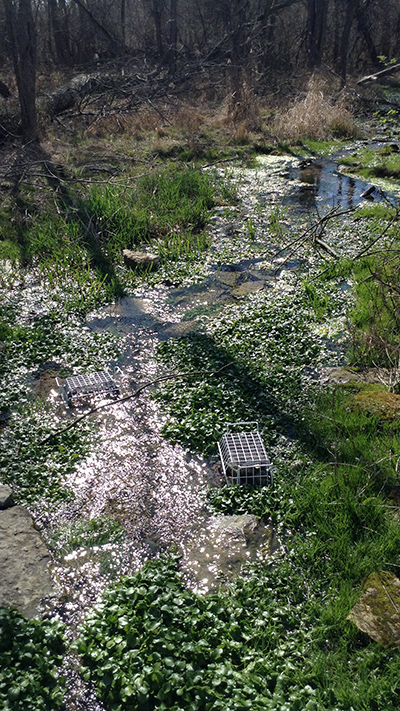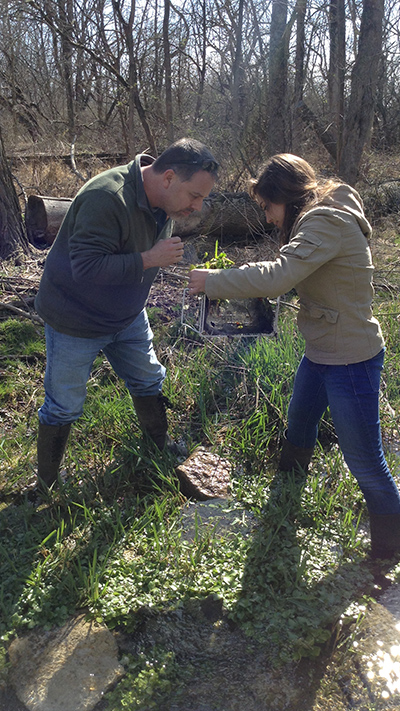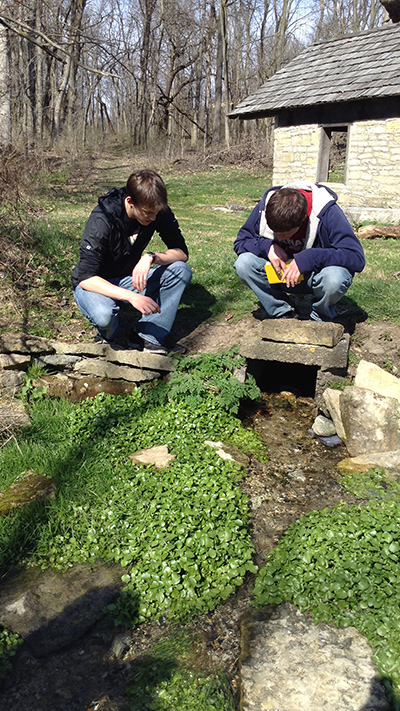College of Arts and Sciences Newsroom
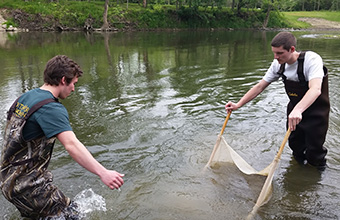
Dean's Summer Fellows
University of Dayton junior Corey Kuminecz could have worked a typical summer job back home in Indiana, but it would have done little to advance his skills for a potential career in environmental biology. Instead, he is assisting in a National Science Foundation-funded research project to study the impact of invasive honeysuckle shrubs on the biodiversity and function of Dayton-area streams.
Kuminecz is conducting faculty-mentored research as part of the College of Arts and Sciences Dean’s Summer Fellowship program. Now in its sixth year, the program provides undergraduate students with high-impact experiential learning opportunities, as well as on-campus summer housing and a dining allowance.
"Without the fellowship, it would have been a lot easier to stay home in South Bend and work at the golf course," he said. "Having somewhere to stay and not having to worry about that was definitely a great opportunity."
This summer, 34 undergraduates are participating in the program, up nearly a third from last year. Their research projects span the natural sciences, social sciences, arts and humanities.
The goal is to encourage undergraduate research outside the regular academic year, said Jason Pierce, College dean. Providing housing at Marycrest Hall and a modest stipend helps remove potential financial barriers for students. The program is supported through gifts to the Dean’s Fund for Excellence.
Fellows are nominated by faculty, who then work closely with those students during the summer months, when faculty typically focus on their own research efforts. Fellowship recipients learn how research is conducted in their discipline, and often complete projects that lead to peer-reviewed publications and presentations, which can open doors to careers and graduate school.
"Students are able to work elbow-to-elbow with the faculty member on the particular project, so it’s a very deep mentoring experience for the students and faculty," Pierce said.
Marissa Jama, a senior from Downers Grove, Illinois, is conducting laboratory research with biology professor Jayne Robinson, who has received two patents on her unique methods of combating antibiotic-resistant bacteria.
Jama, a biology major, is learning to use a state-of-the-art confocal laser scanning microscope to study the cell wall structure of a microorganism similar to the bacterium that causes tuberculosis, in order to learn how to kill it.
"It is amazing to be an undergrad and have the opportunity to do such cutting-edge research at such a young age," she said. She is highlighting her research experience on her medical school applications.
Joey Fay, a senior history major from Glencoe, Illinois, is using a University database and archives to research American Catholic reaction to the rise of fascism during the 1920s under Pope Pius XI. Fay said he was grateful for the experience, which has affirmed his decision to pursue a doctorate degree.
"It's an honor to be selected," he said. "It is almost unheard of for undergraduate history students to have research opportunities."
Fellows are given the opportunity to present their research at appropriate showcases, and have it videotaped for their portfolio. Or, in the case of junior Alexander Mingus, it might end up being shown to members of the U.S. Congress.
Mingus, a political science and human rights studies major from Athens, Alabama, is collecting data and mapping connections to support the University Human Rights Center’s effort to eliminate Brazilian forced labor-tainted projects from the supply chains of U.S. companies. He helped prepare a visual presentation of the center’s findings that was presented in June to Catholic Relief Services, a partner in the project. The presentation was then shown to U.S. Rep. Chris Smith of New Jersey to support proposed legislation about business supply chain transparency.
"Across the board, this program transforms our students from consumers to producers of new knowledge and insight," Pierce said. "I am deeply grateful to those who give to the College Dean’s Fund for Excellence so more undergraduate students can experience this firsthand."
- Dave Larsen, communication coordinator, College of Arts and Sciences
2016 Dean’s Summer Fellows
| Student | Department | Faculty mentor |
| Jonathan Alessi | Chemistry | Vladimir Benin |
| Emily Bartolone | Visual arts | Emily Sullivan |
| Sarah Byrne | Biology | Amit Singh |
| Eric Borth | Biology | Ryan McEwan |
| Michael Coladipietro | Chemistry | Shawn Swavey |
| Logan Cooper | Theatre | Matt Evans |
| Travis Dwire | Theatre | Matt Evans |
| Alexander Farmer | Chemistry | Judit Beagle |
| Joey Fay | History | Caroline Merithew |
| Neil Glenn | Biology | Amit Singh |
| Nour Teresa Goodfriend | Political science | Tony Talbott |
| Julie Hays | Geology | Allen McGrew |
| Elizabeth Henn | Theatre | Matt Evans |
| Ben Hire | Chemistry | Judit Beagle |
| Victoria Jablonski | Theatre | Donna Beran |
| Benjamin Jalowiec | Theatre | Matt Evans |
| Marissa Jama | Biology | Jayne Robinson |
| Christian Jensen | Biology | Mark Nielsen |
| Corey Kuminecz | Biology | Ryan McEwan |
| Jenna Ladner | Chemistry | Vladimir Benin |
| Katherine LoBosco | Music | Susan Gardstrom |
| Meg Maloney | Biology | Ryan McEwan |
| Cristian Mantilla | Chemistry | Matthew Lopper |
| Alexander Mingus | Political science | Tony Talbott |
| Krista Morford | Chemistry | Shawn Swavey |
| Eric Newton | Biology | Yvonne Sun |
| Taylor Orr | Visual arts | Emily Sullivan |
| John Quinn | Chemistry | Shawn Swavey |
| Matt Riccetti | Biology | Amit Singh |
| Camila Robles | Political science | Tony Talbott |
| Logan Roebke | Biology | Maduri Kango-Singh |
| Victoria Spradling | Biology | Tom Williams |
| Maureen Stinehart | Theatre | Matt Evans |
| Ashlee Wertz | Chemistry | Mark Masthay |

